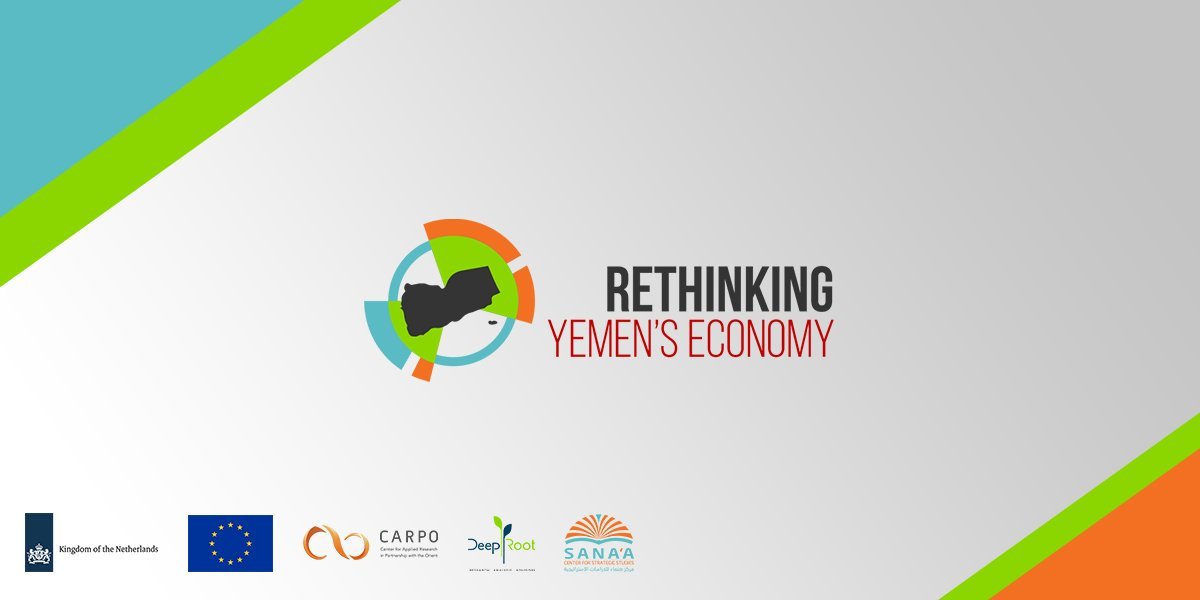Public Consultations and Outreach
RYE / Brussels MENA Briefing on ‘The Economic Dimensions of the Conflict in Yemen’

October 6, 2020 Online
The Brussels MENA Briefings are in-depth, invite-only roundtable discussions on topics of current significance in the MENA region, co-hosted by CARPO and the Stimson Center and held in Brussels on the first week of every second month. In October 2020, the Rethinking Yemen’s Economy (RYE) initiative co-hosted this Briefing. Development Champion Laila Tawfik Anaam, co-founder and managing director of the Yemen Loan Guarantee Program at the Social Fund for Development in Yemen, spoke at the briefing, along with Rafat al-Akhali, founder and managing director of DeepRoot Consulting, an implementing partner at RYE. CARPO President Marie-Christine Heinze moderated the session.
The speakers explained that approximately 40 percent of Yemeni households have lost their primary source of income in both the private and public sectors, noting that fisheries and agricultural entrepreneurs in particular had been hit hard by the devastating effects of the war. In addition, they outlined how the banking sector has effectively collapsed while the monetary system has become dysfunctional. Both speakers referred to the severe consequences caused by the split in the Central Bank of Yemen, which has led to conflicting monetary policies. Government agencies have not been able to provide regular salaries or social welfare payments, they added.
Anaam shed light on the grim prospects for small and medium-sized enterprises (SMEs) in Yemen, which are heavily impacted by closures and restrictions at sea ports, airports and land border crossings. These make any form of cross-border trade extremely difficult and cost-intensive. Mobility within Yemen has been reduced massively, it was pointed out, because of the destruction of the country’s infrastructure such as roads, bridges and tunnels, as well as checkpoints and frontlines. Basic needs of businesses, such as electricity, present serious challenges for entrepreneurs, who must depend on (private) generators which often cannot operate due to fuel shortages, Anaam explained. She said SMES were in dire need of a legal framework enabling them to operate at land borders, sea ports and airports, as well as an overall easing of taxation and the establishment of supporting microfinance institutions with lending capital. It was reiterated that the agricultural sector (fishery, livestock, etc.) should be prioritized in this effort as this would help to address food insecurity.
Meanwhile, Al-Akhali argued that, In general, the war should be seen through the lens of the economy. He explained that the conflict was a battle for the “commanding heights” of the country’s economic resources and institutions. He also highlighted that there are currently no real economic incentives for any party to stop the war. Any peace agreement for Yemen must entail a clear roadmap for economic stability, yet the ongoing UN-led peace efforts fall short of addressing the economic drivers of the conflict, according to Al-Akhali. Top of the agenda should be the need to re-establish a single Central Bank; resume regular payments of public sector salaries; reach an agreement on the allocation of natural resources revenues; and clearly outline the path towards reconstruction and economic recovery. While this is a major task, Al-Akhali recalled precedents and blueprints of similar approaches in the past, namely the Dayton Accords and their focus on the Central Bank board and governor in Bosnia and Herzegovina, the Accra Agreement which entailed a Governance Reform Commission and a Contract and Monopolies Commission, and the case of Angola, where economic power-sharing in the Cabinda Province was part of the conflict settlement strategies.
Both speakers said the European Union should play a role in conflict resolution in Yemen. The economic factors raised could serve as points of departure for European initiatives to support the Yemeni process through diplomacy, aid, investment, capacity-building and efforts for reconstruction and reconciliation, they added.